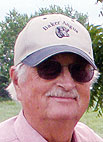
For over 58 years registered Angus cattle have grazed the pastures of Baker Angus in Butler, Mo.
Jack Baker purchased his first registered Angus heifer in 1953 as an FFA project. Once Jack graduated from high school in 1957 he married his high school sweetheart, Nancy, and went to work farming fulltime. The couple has been farming together ever since.
The farm where they raised their four children, Jody, Jacque, Jamie and Joni, adjoins the same land and farmhouse were Jack was raised.
Jack has been a leader of cutting edge technology in the Angus cattle industry. Baker Angus started performance testing their herd in 1963. “It wasn’t very popular back then,” said Jack. “We sold in the third annual performance tested bull sale. It helped get our name out over the state.”
In 1969, Jack started using AI in his herd. “We have been AI’ing more than 90 percent of our herd ever since,” explain Jack.
Then in the 80’s Baker Angus started utilizing ultra sounding in their herd.
Keeping up with technology hasn’t slowed down at Baker Angus. Just last year Jack began using Genomic DNA testing on his bulls. In order to get the results Jack takes a blood sample from the ear of each bull. It takes about six weeks to get the results. The results score (on a 1-10 scale) a variety of carcass traits including calving ease direct, birth weight, weaning weight, average daily gain, yearling weight, residual feed intake, dry matter intake, yearling height, scrotal circumference, docility, heifer pregnancy rate, maternal calving ease, maternal milk, mature weight, mature height, carcass weight, marbling, ribeye area, fat thickness and tenderness.
“Last year we DNA tested all of our bulls – we are one of the first producers to do so,” stated Jack. He believes that as the accuracy gets better DNA testing will become more important.
The first Sunday of each November Baker Angus host their Performance-Tested Angus Production Sale at their farm. Last year they sold 45 bulls at the sale, all of which were DNA tested. Baker Angus sells by private treaty the rest of the year. They have sold cattle in 15 states and Brazil.
Along with their registered herd, Jack runs a commercial herd. Jack uses registered bulls on his commercial cows. At about nine months old the calves are sold as feeder calves at local sale barns.
All records are kept the old fashion way, by hand in a book that Jack keeps in his pocket. Each animal is tagged, tattooed and weighed at birth and then weighed again at weaning and as a yearlings.
One of the things Nancy is in charge of is engraving every ear tag. “It’s very important how we record each animal from the time they are born to the time they’re sold,” emphasized Nancy. Each ear tag displays the birthdate, dam number, sire number and calf identification number which is also the tattoo number and Angus registration number.
To utilize the farm as efficiently as possible Jack plants corn, soybeans and wheat. All the corn harvested on the farm is ground and fed on the farm. The cattle are also grazed through the crop roughage.
Baker Angus has two fulltime employees and three Border Collies to keep things running smoothly.







